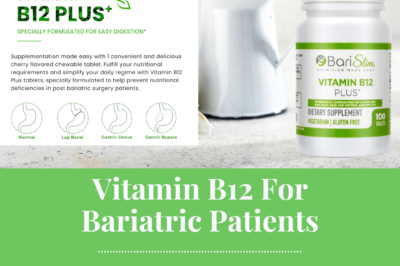Risks or Side Effects Associated with Vitamin B12 Supplementation for Bariatric Patients
Introduction To Vitamin B12
Bariatric surgery is a transformative step towards weight loss and improved health for individuals struggling with obesity. However, this surgery can impact the body’s ability to absorb essential nutrients, including Vitamin B12. Hence, supplementation becomes vital post-surgery to prevent deficiencies. In this article, we’ll delve into the risks or side effects associated with Vitamin B12 for bariatric patients and the importance of bariatric vitamins and supplements.
Introduction to Bariatric Surgery and Vitamin B12
Bariatric surgery involves altering the digestive system to aid weight loss, resulting in restricted food intake or reduced nutrient absorption. While it aids in weight reduction, it can impede the absorption of crucial vitamins and minerals, particularly Vitamin B12.
Importance of Bariatric Vitamins and Supplements
Following bariatric surgery, the body’s ability to absorb nutrients like Vitamin B12 diminishes, leading to deficiencies that can cause fatigue, weakness, neurological issues, and anemia. Bariatric vitamins and supplements, including Vitamin B12, play a pivotal role in preventing these deficiencies.
Understanding Vitamin B12 Supplementation Post-Bariatric Surgery
Why Bariatric Patients Need Vitamin B12 Supplementation
Bariatric patients often require Vitamin B12 supplementation due to reduced stomach acid, which hampers the breakdown of B12 from food, leading to lower absorption.
Risks and Side Effects Associated with Vitamin B12 Supplementation
While Vitamin B12 supplementation is crucial, excessive intake or improper administration can result in certain risks or side effects. These may include allergic reactions, skin rash, nausea, or even an imbalance in other B vitamins.
Types of Vitamin B12 Supplements Suitable for Bariatric Patients
Different forms of Vitamin B12 supplements, such as methyl cobalamin or cyanocobalamin, exist for bariatric patients. Choosing the appropriate form depends on individual needs and absorption capabilities.
For bariatric patients, who have undergone weight loss surgery, it’s important to consider specific forms of vitamin B12 supplements due to potential absorption issues. Here are various types suitable for such individuals:
Sublingual Tablets or Lozenges: These dissolve under the tongue and bypass the digestive system, facilitating absorption directly into the bloodstream.
Intramuscular Injections: Administered by a healthcare professional, these injections deliver B12 directly into the muscle, ensuring absorption even with compromised digestion.
Nasal Sprays: B12 in nasal spray form may be an alternative for those who struggle with oral supplements. It’s absorbed through the nasal mucosa.
B12 Patches: Transdermal patches deliver the vitamin through the skin, providing an alternative route of absorption.
Liquid Supplements: High-dose liquid B12 supplements can be absorbed more easily than pills for some individuals, particularly those with absorption difficulties.
Chewable Tablets: Some individuals find chewable B12 tablets easier to digest and absorb compared to standard tablets or capsules.
Dosage and Timing for Vitamin B12 Supplementation
Determining the right dosage and timing of Vitamin B12 supplementation is critical post-bariatric surgery. Healthcare providers often recommend specific doses and schedules based on the patient’s condition and surgery type.
Monitoring and Managing Vitamin B12 Levels
Regular monitoring of Vitamin B12 levels is essential to ensure adequacy without reaching excessive levels. Adjustments in dosage or form may be necessary based on the patient’s response and test results.
Common Misconceptions Regarding Bariatric Vitamins
Misinformation about bariatric vitamins and supplements can lead to confusion. Debunking myths such as “food alone suffices for meeting nutritional needs” is crucial for patient adherence to supplementation regimens.
Tips for Successful Vitamin Supplementation After Bariatric Surgery
Adhering to a prescribed supplementation routine, maintaining a balanced diet, and seeking professional guidance are essential for successful Vitamin B12 management post-bariatric surgery.
Advisory and Precautions for Bariatric Patients
Bariatric patients should heed precautions such as avoiding self-medication, following healthcare provider recommendations, and reporting adverse effects promptly.
Scientific Studies Supporting Bariatric Vitamin Supplementation
Several scientific studies highlight the significance of Vitamin B12 supplementation in maintaining optimal health post-bariatric surgery. These studies emphasize the need for personalized care and attention to nutritional needs.
Consulting Healthcare Professionals for Personalized Guidance
Individualized guidance from healthcare professionals is indispensable for bariatric patients to navigate the complexities of Vitamin B12 supplementation and overall nutritional health.
Potential Interactions of Vitamin B12 with Other Medications
Certain medications may interact with Vitamin B12 supplements, potentially affecting their efficacy. Discussing these interactions with healthcare providers is crucial to prevent adverse effects.
Conclusion: Prioritizing Vitamin B12 Health Post-Bariatric Surgery
In conclusion, understanding the risks, benefits, and nuances of Vitamin B12 supplementation post-bariatric surgery is pivotal for optimal health. Prioritizing regular monitoring, appropriate supplementation, and healthcare professional guidance ensures effective management.
